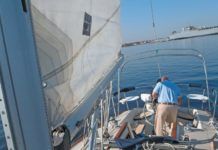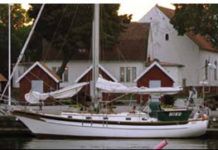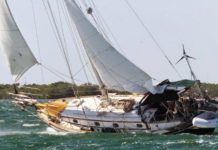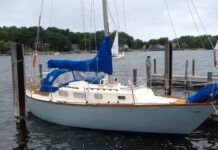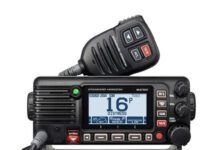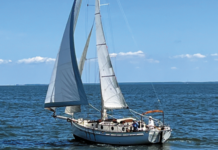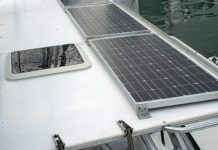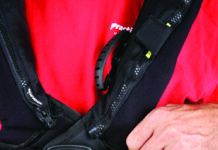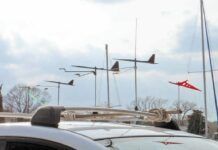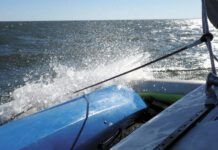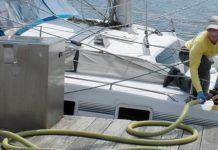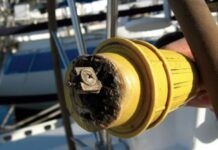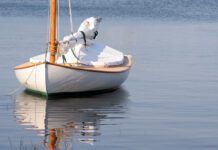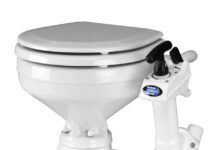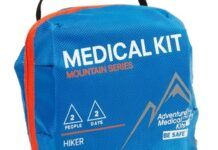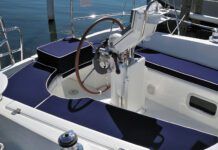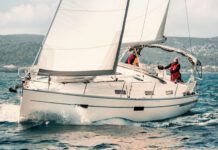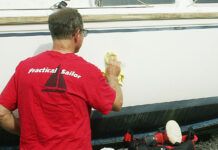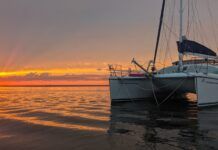Kirkpatrick Macmillan would be impressed. Hes the Scotsman who invented the bicycle in 1839. But two wheel inventiveness didnt stop there. For the past 160 years, new iterations of one of mans oldest transport systems have appeared like zebra mussels. Take the foldable bike-a nifty accessory for any sailor who prefers biking to trekking from harbor to town and has the space to store a bike.
We tried bikes from Dahon, Strida, Montague, Bike Friday and Burley, judging each on ease and time of assembly, quality of design, compactness, marine-environment suitability, cost and several other criteria. What we found was a very eclectic bunch of products, each designed by biker-heads with their own idea of what a folding marine bike should be.
Only Dahon and Montague are carried in marine catalogs. Others are available in bicycle specialty shops or directly from the manufacturer. Also, if buying directly from a manufacturer, add some assembly time for attaching pedals, front wheels, seats, etc., which most require you do.
Strida
You want light? Fast assembly? Easy storage? The A-frame Strida, invented by the U.K.s Mark Sanders, certainly delivers on those scores. In fact, nothing comes close for simplicity, ease of use and saltwater imperviousness. So what if it looks like a pyramid of aluminum trusswork fresh from a circus act? The riding position is comfortable, the design is simple (three tubes, three joints), it clicks together in under 10 seconds, its corrosion-proof (Series 500 powder-coated aluminum), and although its designed for short journeys (single speed), the manufacturer claims its been ridden the full length of New Zealand and down the banks of the Nile. Down maybe; they don’t mention the up part, and thats a problem.
On the Plus Side: In addition to its light weight, simple assembly and compactness, we liked the Stridas soft, leather-wrapped handlebar grips, the upright riding position, the drive system (a grease/maintenance-free Kevlar-reinforced cog belt means no messy chain), the fenders and reflective strips front and rear for night use, the no-brainer folding/unfolding instructions (release the bottom tube and collapse the wheel base-simple), and the ability to store the bike in a sail locker or the lazarette of a small boat.
On the Other Hand: Though the Strida is acceptable for short boat-to-town trips (so long as the terrain is flat), its single speed is a real drawback (its a chore to pedal uphill and the gearing limits your speed on the flat). The luggage rack is too small to be of much use, and though the Stridas extremely short wheelbase makes it highly maneuverable, the small 16-inch wheels can result in over-steer-meaning once you begin a turn, the bike (unlike a conventional bike that returns to center) wants to continue turning.
Montague MX
Said one tester: This isn’t a folding bike; this is a performance bike that just happens to fold. The $550 MX is a rugged, full-size, fat-tire mountain bike that can tackle the steep (Shimano 24-speed) and the gnarly (RST 281 front shocks) with comparative ease. It comes 99% assembled-you need only attach the front wheel, pedals and seat post-and its all put together with four quick-release levers. The hinges are no-wobble (unlike most other bikes, no structural tubes are cut in half), the Series 7005 aluminum alloy components are said to be corrosion-resistant (we did not have an opportunity to test the claim) and it comes in two frame sizes: 18″ for riders 5′ 4″ -5′ 10″ and 20″ for riders 5′ 10″-6′ 4″. The finish and workmanship are excellent, by far the best of all the bikes we tested. However, given the bikes full-size, 26-inch-wheel configuration, its also among the heaviest of those we tested. This bike arrived untuned-a rare occurrence, according to the manufacturer, who told us each bike is normally fully tuned before shipping. To their credit, we were asked (as any customer would be asked) to take the bike to a local shop and Montague would pick up the expense of tuning.
On the Plus Side: If youre up for a workout, want to explore the puckerbrush or looking to travel any distance, the Montague MX is the obvious choice. Its engineering is impressive, its joint attachments solid, and the quality feel impressed us. If, on the other hand, youre not a fan of mountain bikes (the riding position can cause fatigue if youre not accustomed to it), Montague also sells a CX full-size Comfort model for $100 less ($450). Allowing a more upright riding position, it comes with higher handlebars, extra cushioning in the saddle, grip shift and 21 speeds. And if you and crew like to pedal together, Montague also makes the TriFrame, a foldable tandem bike that collapses in less than two minutes from 8 feet to 3 feet. Its pricey ($2,495), but if togetherness counts, youve got to be willing to pay for it.
On the Other Hand: As in a conventional mountain bike, there are no fenders, chain guard or rear rack. We could not find a comfortable riding position; with the seat raised to its proper height, the handlebars were too low for our liking, and the handlebar stem could not be adjusted upward. With the two-lever handlebar shift system, we found it difficult to see what gear we were in. We solved that by recan’ting the shift lever housing upward to provide a better display. For these reasons, wed recommend the CX for the price and for the more comfortable ride it provides.
Bike Friday Navigator
The $795 Navigator by Bike Friday (named for Robinson Crusoes trusty companion) comes in two sizes-large (for riders 5′ 8″-6′ 2″) and small (riders 4′ 10″-5′ 10″). Although the frame is powder-coated aluminum alloy, the manufacturer recommends a corrosion-resistant treatment like T-9 Boeshield be applied to protect the uncoated interior portions of the frame. This is Bike Fridays only assembly line bike, but they also make a series of custom-built folding bikes-road, touring, mountain, hybrid and available in single, tandem or recumbent (rider-prone) configurations. A seven-speed version of the Navigator, called the Metro, is also available for $675, a substantial savings and worth it unless you plan to bike in very hilly terrain.
On the Plus Side: Like the Montague, the engineering and workmanship is high quality. The upright riding position is comfortable and, even with its 20-inch wheels, we felt as though we were pedaling a solid, full-size bike. The 21-speed, grip-shift gear selectors are situated on top of the handlebars and are easy to read (though, unlike other bikes you may be accustomed to, low speed on the macro shift is 3 rather than the more common 1) and the bike comes with a kickstand. Although the instruction manual is weak, if you purchase the optional hard travel case (an additional $217), an excellent how-to-fold-and-pack-it video is included, as is a tool bag, a hardcover bike-tuning manual and-get this-even gloves. The travel case, which is lockable, also reduces the bikes exposure to the saltwater environment, and we therefore recommend it.
On the Other Hand: No fenders, no chain guard, no rear rack (available as an accessory) and the handlebar grips are too small for anyone with large hands. The tires are a bit narrow for our taste, an impression confirmed by our often disastrous departures into bumpy terrain. Although the bike takes only 30 seconds folding time, disassembling and packing it into the optional hard travel case took us nearly 15 minutes.
Dahon Mariner
The ubiquitous Mariner (sold by West Marine, BOAT/U.S., Defender Industries and other marine catalog houses) may look retro-Fifties with its fenders, reflectors, chain guard and beige-sidewall tires, but it still delivers a lot for the price (weve seen it for as little as $339.95 at Defender). Its high-tensile triple triangle steel frame is coated with a blue-satin marine-grade finish and the bike comes with a variety of alloy components (seat post, kickstand, hubs, brakes). The spokes are stainless steel and the chain, claims Dahon, is rustproof. Assembly and knock-down are simple, and the grip-shift, seven-speed Shimano drive system is a cinch to use.
The Mariner also comes with a 13-inch rear rack that is large enough to actually be useful.
On the Plus Side: The upright riding position is comfortable, and the bike has a durable look and feel. Unfolding it is a snap: Swing the frame sections apart, secure the frame latch, tighten two quick-release levers at the seat and handlebar posts and youre on the road. We also liked the fore/aft reflectors for nighttime use and the fat 20-inch wheels, which felt more road-worthy than 16- or 18-inch wheels for extended rides.
On the Other Hand: The Mariner is the heaviest of the small-wheel bikes we tested. Although the kickstand is a nice feature, we found it tough to collapse at first; you must kick it in and back in one continuous motion. Unless you purchase the bike through a Dahon dealer, who presumably will have already tuned it, Dahon requires that you take it to a bike technician for final adjustment before your warranty is activated. Our local bike shop charges $40 for such a service, so if ordering direct from Dahon, consider that an additional expense. Finally, we found the users guide a bit off-putting. The beware-this-never-do-that and basic cycling rules (Learn and obey local traffic regulations… Watch for cars) seem written for children.
Burley Birdy 7
The German-made (and at $995, pricey) Birdy 7 is unique in that its suspension system is part of the bikes folding mechanism. The suspension uses a leading-arm suspension fork at the front with a coil-spring shock, which we found not only increased the bikes handling capabilities and riding comfort but created an anti-dive effect in the front suspension when braking. The finish and quality of workmanship are high and the components (frame, suspension, seat post and handlebar post) are solidly made. Metal components (frame, fork, stem, wheels) are corrosion-resistant aluminum alloy.
On the Plus Side: The bike is exceptionally rigid, but rivals the Strida in lightness. Its top tube is low enough to enable very short riders to handle the bike easily. At the same time, the oversized seat post and the upward-adjustable handlebar post will also accommodate tall riders, and the handlebar post can be adjusted upward. The seven-speed grip shift is closely notched, so theres no need to rotate your hand excessively to select the gear you want. When folded, the Birdy will stand by itself, handy when you have nothing nearby to lean it against.
On the Other Hand: The Birdy has no fenders or chain guard. It requires that you lift the rear of the bike upward to release and rotate the rear wheel into position. In doing so, we found that the chain came off the front sprocket, requiring that we refold and unfold the bike again more slowly to align the chain onto the sprocket. You must also move the chain to the smallest rear cog and rotate the crank so that the left-side pedal is straight down in order to fold the bike. The saddle, frankly, was a pain. To position it at a comfortable level, it was necessary to loosen the saddle clamping mechanism to tilt it to the proper position, then retighten the clamps, which consist of five parts (clamps, cross piece, screws) and which are tough to manipulate at the same time unless you have three hands. This, of course, need only be done once-during original assembly-but it caused no end of frustration. Suggestion for Burley: Package the bike with the saddle and saddle post already attached.
Bottom Line
Each of the bikes we tested seems to have a specific customer in mind: high-performance cycler (Montague), the mechanically or storage-impaired (Strida), two-wheel techie (Bike Friday, Birdy 7) or the boater simply looking for basic transportation at a good price (Dahon).
Our choice: the Dahon Mariner. It may not have the fanciest components (e.g. side-cable rather than V-cable brakes), but they seem up to the task, and the Mariner includes more goodies (fenders, chain guard, kickstand, rear rack) than the others. And, you can buy two for less than it would cost to purchase, say, a Bike Friday or Birdy 7. Our second choice: the Montague CX. Although we liked the MX, the CX is basically the same bike, depowered for greater riding comfort and costing $100 less.
Finally, riding ease and comfort-rather than speed of folding/unfolding-should be your first concern. A second, more obvious consideration is storage space. Will a bikes dimensions, when folded, allow you to tuck it away in a locker or lazarette? And tire size; those 16- and 18-inch wheels may make for a more compact bike, but they will wear faster and wont be as stable on bumpy roads as a larger size. It is worth remembering that 20-inch tires are standard BMX size, so most bike shops will carry them in case you need a replacement.
Contacts- Bike Friday, 4065 West 11th St., Suite 14, Eugene, OR 97402; 800/777-0258, www.bikefriday.com. Burley, 4020 Stewart Rd., Eugene, OR 97402; 800/311-5294, www.burley.com. Dahon, 833 Meridian St., Irwindale, CA 91010; 626/305-5264, www.dahon.com. Montague, PO Box 381118, Cambridge, MA 02238; 800/736-5348, www.montagueco.com. Strida, PO Box 381054, Cambridge, MA 02238; 800/787-4322, www.strida.com.


